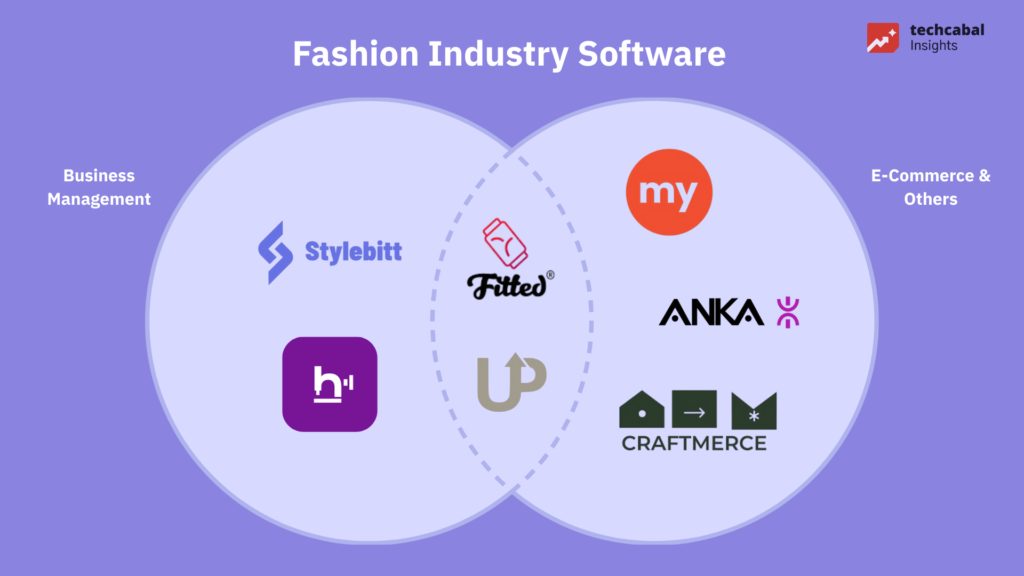Consider for a minute, Stylebitt co-founder, Precious Aleaji, invites me over a video chat, how most industries have foundational software(s) with which they operate. In the service industry, a customer care agent must know their way around Zendesk; in writing and publishing, a range of software from Scrivener and WordPress to InDesign. A banker must know their way around Finacle or other similar software. The fashion industry, at least as it operates in Nigeria and most parts of Africa, though valued at around $31 billion, has no such distinct software.
Aleaji knows this because he’s worked in the fashion industry for most of his young adult life. After learning to make leather footwear at 10, he later founded and ran Legendfitz, a leather shoe manufacturing company, until 2020, when it shut down due to pandemic-induced supply chain glitches and declining sales. After it shuttered, Aleaji went to work for several Lagos fashion houses, which exposed him to the operational gaps fashion designers faced. It was during this period that the idea for Stylebitt, a fashion business management software, was conceived. The first version was released in mid 2023.
One of those fashion houses was Ngolongolo Couture, a high-end bespoke fashion business located in Victoria Garden City on the Lagos Island. He joined the business around Christmas time. If you’ve tried to have clothes made in Nigeria during a festive season, you’ve likely worried about or been at the receiving end of one of many inefficiencies of Nigerian fashion businesses; from delayed delivery timelines to inaccuracies in style or proportion.
Aleaji said it was no different at Ngolongolo Couture: they were only able to fulfil about 47% of orders around that period due to some of those familiar issues, which inadvertently left some customers dissatisfied. The business, like the others he worked at, became “like a space of research,” Aleaji said, informing the features that Stylebitt offers tailors and other fashion entrepreneurs today.
How many measurement books do you need?
Though African fashion is increasingly taking centre stage globally, it is still largely informal, and thus plagued by infrastructural and operational deficiencies. Technology, like online marketplaces and e-commerce, has helped bridge some of those gaps, but the industry is yet to see tech adoption on the scale that transforms its backend operations: inventory and personnel management, cost of operations, invoicing, and other elements that scale a business and make it profitable.
For one, many Nigerian tailoring and fashion businesses rely heavily on manual tools for their operations. Fashion entrepreneur, Chidimma Owoh, whose Lagos-based bespoke tailoring outfit has been operational for about four years, said she keeps track of her operations manually. Owoh said that at the beginning of every month, she takes stock of what jobs the business has in the pipeline and whether her rotational staff of three to four tailors can accept more orders or not. Her tailoring business makes women and children’s clothing with prices starting at ₦150,000 ($94).
Owoh’s continued use of manual tools isn’t due to a lack of trying to adopt technology tools. Owoh said she isn’t very tech-savvy and needs software that isn’t complex. In addition, “most times there’s no Nigerian version,” she said, and paying in dollars with a Naira card is always a hassle. “I definitely want to use a more automated system,” Owoh said.
Hunt Couture’s Abiodun Ettu said on a call that his business, a bespoke menswear brand which he began in 2008, used a workflow notebook to keep track of customer information and production until about six months ago. Ettu said his decision to go digital resulted not only from the need for better oversight of multiple productions and deadlines but also the need to prioritise production of clothes for both high-end and average clientele equally (his outfit makes clothing that range in prices from ₦50,000 to ₦500,000 (~$31 to $311).
At Ngolongolo Couture, where some of the ideas behind Stylebitt first started to take shape, owner Uche Njoku said that when he opened in 2010, he imagined a business that employed some digital tools for efficiency but could not find those solutions. A former professional football player, Njoku began his entrepreneurship journey in Aba, where he was born and raised. His mother owned a fashion business and he often helped out on breaks from school and football. He launched his own business there in 1988, buying fabric and employing tailors to make wears for his clients. He continued for several years in Europe, after his football career came to an end, and saw businesses employ tech tools in obtaining and storing customer information among other business operations. When Aleaji approached him with the idea for Stylebitt, he wasted no time in absorbing the tool into his business. Now, his brand, which caters to a wide range of clients utilises the software to collect and store customer information, among other things.
“There are some clients I’ve known for seven, eight years,” Njoku said, who, after he’s collected their measurements, haven’t had to come into the business on the Lagos Island “unless they lost weight or they added weight” and who continue to patronise his business.
For a brand that now caters to at least a thousand customers in Nigeria and abroad, it’ll require several thick measurement books to record customer information, he joked. A digitised tool that allows you to easily call up or update customer details has been game-changing.
Lawal Abdulrashid, whose business is located along Zaria Bypass in Jos, Plateau State, Nigeria’s Middle Belt region, said he learned about Stylebitt a little late. Abdulrashid’s business, ROL Tailoring, used to be located in Kogi State. Like other tailors, he had a measurement book where he wrote down and stored customer measurements and patterns. After he relocated, a customer contacted him to make an Ankara dress for her. It was in trying to find her measurements that he realised he’d misplaced the notebook during the move.
Abdulrashid said his client had to go get her measurements taken at another tailor’s. “It was so stressful for her,” he said, “and not everybody [is] willing to do that, to meet another designer to take measurements of them and then send it to me.”
If you can’t see it, you can’t track it
When a friend brought the software to his attention—Aleaji and his co-founder, Ibrahim Gana, were on a fact-finding mission to learn the pain points of the businesses the product would serve—Abdulrashid saw the need it could meet for his business almost immediately. It went beyond a digital record book that couldn’t be easily lost. There was the question of how to properly price his services, invoicing accurately so as not to lose income, tracking delivery timelines so as not to disappoint clients, and storing details such as a client’s preferred style to sew correctly.
Stylebitt offers these features and has others in the pipeline. There’s a comprehensive measurement-taking feature on the software that allows a fashion business to collect every imaginable body measurement necessary for bespoke tailoring. Abdulrashid said he’s even learned to make better clothes from collecting some of the measurements in the app that he’d been unaware of.
“For the female body, we collect up to 60 data points and for the male body, we collect up to 50 data points,” Aleaji said.
Tailors can collect images of preferred styles, save them to a customer profile, and send out invoices immediately or on schedule. The app also has a cash flow feature, which allows businesses to track how much they spend on production to track their bottom line accurately. There’s also an option to add other team members to oversee individual customer orders from start to finish, especially useful for fashion businesses that employ several people. Ngolongolo Couture’s Njoku said this feature enables him to track the output of his 46-member team or to know who’s responsible when things go wrong with a client’s order.
Aleaji says the software is designed with made-to-order fashion businesses in mind—most fashion businesses in Nigeria, including those that market themselves as ready-to-wears, operate a made-to-order model. However, they’ve worked with brands that have grown their capacity to become ready-to-wear businesses. For this reason, the product is priced on a tiered structure: at one end is a $2/month package designed for one-person operations, and on the other end, a $30/month subscription for more established businesses with larger teams. These comprise premium access to its suite of tools and features. There’s also a free version with more limited access. This is the version Abdulrashid has been using so far in his business though he’s looking forward to paying for the app as he learns more about what features a premium version will make accessible to him.
In addition to better record-keeping and invoicing, he said the app has helped him in “keeping track of how well the business is doing.” Not having this information in the past cost him an entrepreneurship prize that would’ve seen an injection of $5,000 into his business, he said. Now, not only can he track how much income the business makes more accurately, but he can also set revenue targets because he has more visibility on his capacity and how much the business can grow.
Tech meets fashion
Stylebitt is not the only homegrown software like it for the fashion industry in Nigeria and Africa, though Aleaji argues that it occupies a large market share among competitors. Some of those competitors include generic retail business management software as well as solutions like Fitted (launched in 2021 and integrated with e-commerce capability) and Stitchvine, both locally-grown solutions for fashion business management. Globally, solutions like US-based ApparelMagic and Uphance enable fashion businesses to track everything from customer information to inventory and cash flow.

Fashion entrepreneurs like Owoh, who still partly rely on manual tools for their operations, see the need for solutions like these in their businesses, but navigating complex applications or business management software not specifically designed for the fashion industry remains a deterrent to adopting one. “If there’s a faster way or simpler way to do something, it’s better,” Owoh said, adding that she often downloads software like this when she comes across online ads, but none has become an essential part of her operations. “What’s been helping me now is ChatGPT,” she said, adding that the app has helped with scheduling tasks, developing step-by-step plans to train her staff, and other similar tasks. “It’s the most useful app for me right now,” Owoh said.
Onyeka Onugha, another fashion entrepreneur whose outfit, Iphie Impressions, has been operational since 2023, said she has manually tracked her business operations on paper and does not use management software, only because she has no idea what exists in the market or which ones to use. “If there’s any software or app that I can use to do this, I’d be glad to learn to add it to my business,” Onugha said. “I’m open to new technology and innovation that will help me track my business records, my income and expenditure, and how far I’ve gone.” Iphie Impressions is a made-to-order brand specialising in Ankara boubou dresses for adults and kids, two-piece outfits, hair bands, and tote bags. Onugha said, with any luck, she’s looking to grow into a ready-to-wear brand in the future.
Hunt Couture’s Ettu said the management software his business has since adopted for order management and customer records was designed specifically for his operations, hinting at another way fashion businesses, especially big-name brands, might be approaching their software management solutions.
“It has been a good addition to what we do,” Ettu said.
According to Aleaji, over 19,000 fashion businesses have signed up to the platform, with around 5,000 of them actively using it monthly. While the majority of its customer base is in Nigeria, others come predominantly from Ghana, South Africa, and Kenya. However, the numbers trickle down, covering fashion entrepreneurs from about 40 countries around the world. The focus, though, remains on African fashion businesses who want better oversight of their business, whether they are a bespoke luxury business with one single location in the heart of Lagos Island, or a ready-to-wear brand with several outlets in and outside the country.
So far, Aleaji has self-funded the business alongside his co-founder Gana, whose interest in the product also came from a personal place.
“My mom was a fashion entrepreneur too,” Gana said on the video call. Had this kind of resource been available to her, he believes the business—which struggled and eventually closed due to difficulties tracking finances and managing staff—would still be going strong today. The co-founders met at Nexford University. Combining Aleaji’s software development skills and Gana’s design and sales capabilities, they officially began working on Stylebitt in January 2022 and incorporated their company in August of that year. The first version of the product was released in June 2023.
In February, when I spoke with the co-founders, they were rolling free and basic subscribers into the middle-tier service for businesses, which cost $5 per month. The goal, Aleaji said, was to allow users “get a feel of it, and if you like it, you stay; if you don’t like it, the free plan is always there for you.” But the co-founders are already thinking of other revenue streams: logistics, e-commerce integrations, and more. “So there is a suite of products that we’re going to build,” Aleaji said. Down the line, this data might inform other revenue streams, such as providing credit to help businesses grow their operations.
Aleaji and Gana are looking to seek external funding this year as well as they continue to push for more adoption and improvement in their product. “The goal is to build that wheel that enables fashion businesses to succeed, that empowers them with the tools they need,” Aleaji said.











